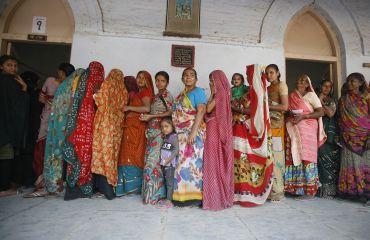 What does the high voter turnout of 68 per cent in the first phase of Gujarat election mean? Sheela Bhatt finds out.
What does the high voter turnout of 68 per cent in the first phase of Gujarat election mean? Sheela Bhatt finds out.
Gujaratis all over the state are trying to decode the meaning of the higher voter turnout in Saurashtra and South Gujarat, which went to polls on Thursday.
Amit Shah, Bharatiya Janata Party candidate from Naranpura and former minister for home, who is also an accused in the Sohrabuddin encounter case, says, "The media and pundits in New Delhi had doubts about our capacity. The voters of Gujarat are having better wisdom, they are not confused."
The higher turnout is due to the fact that the Election Commission distributed the voter's slip this time. Traditionally, political parties used to distribute it.
"Voters are coming to booths without our help. Now, it is difficult to judge if he has voted for us or not," says a BJP worker in Rajkot.
On regional Gujarati television channels many experts were interpreting the 68 per cent voter turnout going either way. "It's possible that there was an undercurrent against the Modi government and it may lose power, or it's possible that Modi will win more than 125 seats," a senior journalist says.
Shah dismisses such argument as idiotic. He says, "If the Gujarat government is getting less than 80 seats, as it is argued, then it should show on the ground in some manner. There are no such signs to suggest a total downfall. So your other interpretation of 125 seats or more has to be correct!"
Complete Coverage | Rediff forecast
Countering Shah's argument, Madhusudan Mistry, senior Congress leader from Sabarkantha and the party general secretary, says, "Since many years the Congress machinery was not able to send the voter's slip to people's doorsteps. Now, the Election Commission has done it.
"Jhupdawalas (slum-dwellers) have got the slips in large numbers, they are voting for us. The higher turnout can't be in favour of the BJP because these voters are poor and minorities who got the chance to vote," he says.
The Congress's inherent organisational weakness is covered by the EC's efforts to distribute the voter's slip, he argues.
A senior leader and former minister in the BJP government says, "The Congress is unaware of the fact that due to the Leuva Patels' assertion before the election and the way they got a large chunk of seats from all three parties, Kadva Patels and other communities like Brahmins, traders and Kashtriyas silently got against them. The rivalry between Leuvas and Kadvas is comparable to the Shia and Sunni divide.
"In villages of Saurashtra, there was mobilisation of non-Patel voters in favour of the BJP to defeat the Congress's plan and Keshubhai Patel's newly-formed Gujarat Parivartan Party's to garner all the Leuva Patel votes."
The higher turnout witnessed during the first phase has given 'the issue' to Gujaratis in a largely issueless and colourless election.
A senior Rajkot-based journalist says, "Maybe there is an undeclared referendum for and against Modi. 'Ane Kadho' (throw him out) was Keshubhai Patel's slogan against Modi. May be non-Patels thought 'Ane Sachvo' (protect him) should be their slogan and came out in big numbers to save Modi."
Image: Women stand in a queue outside a polling booth during the first phase of Gujarat elections at Viramgam town near Ahmedabad
Photograph: Amit Dave/Reuters










